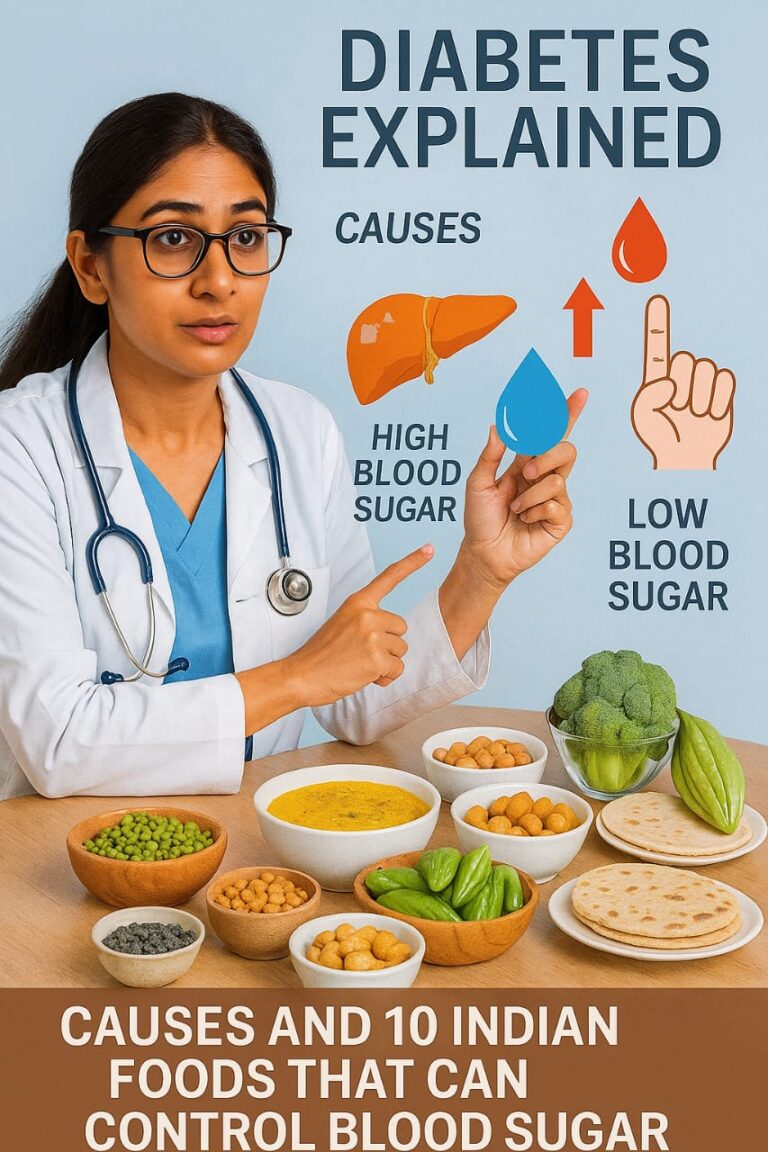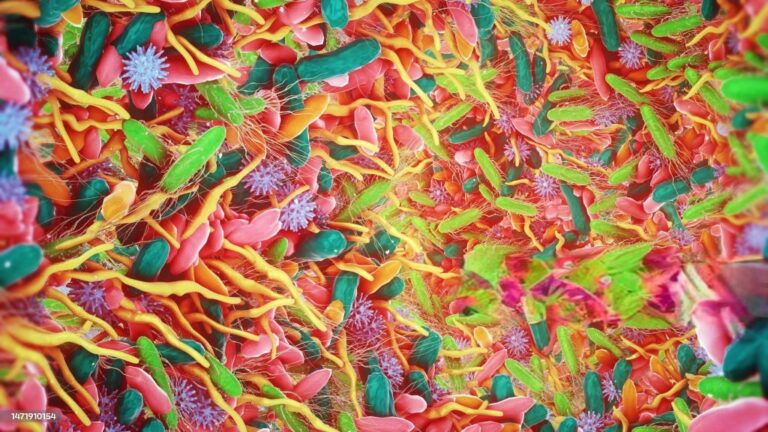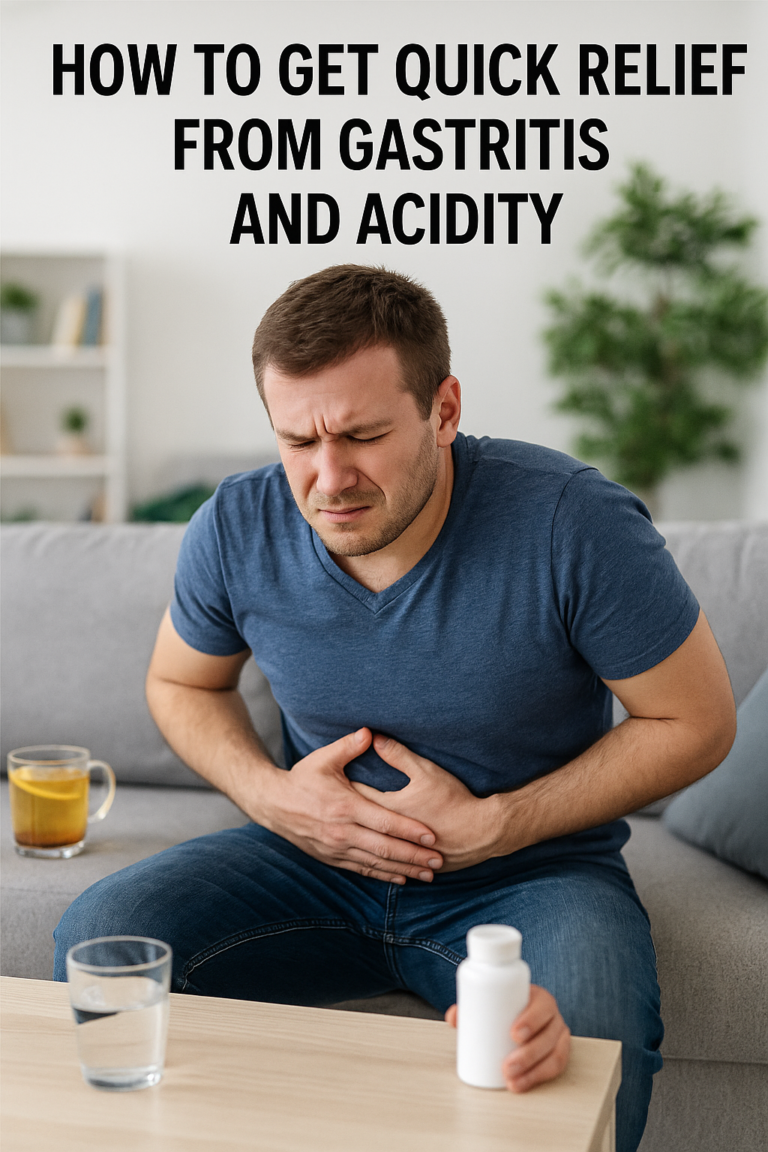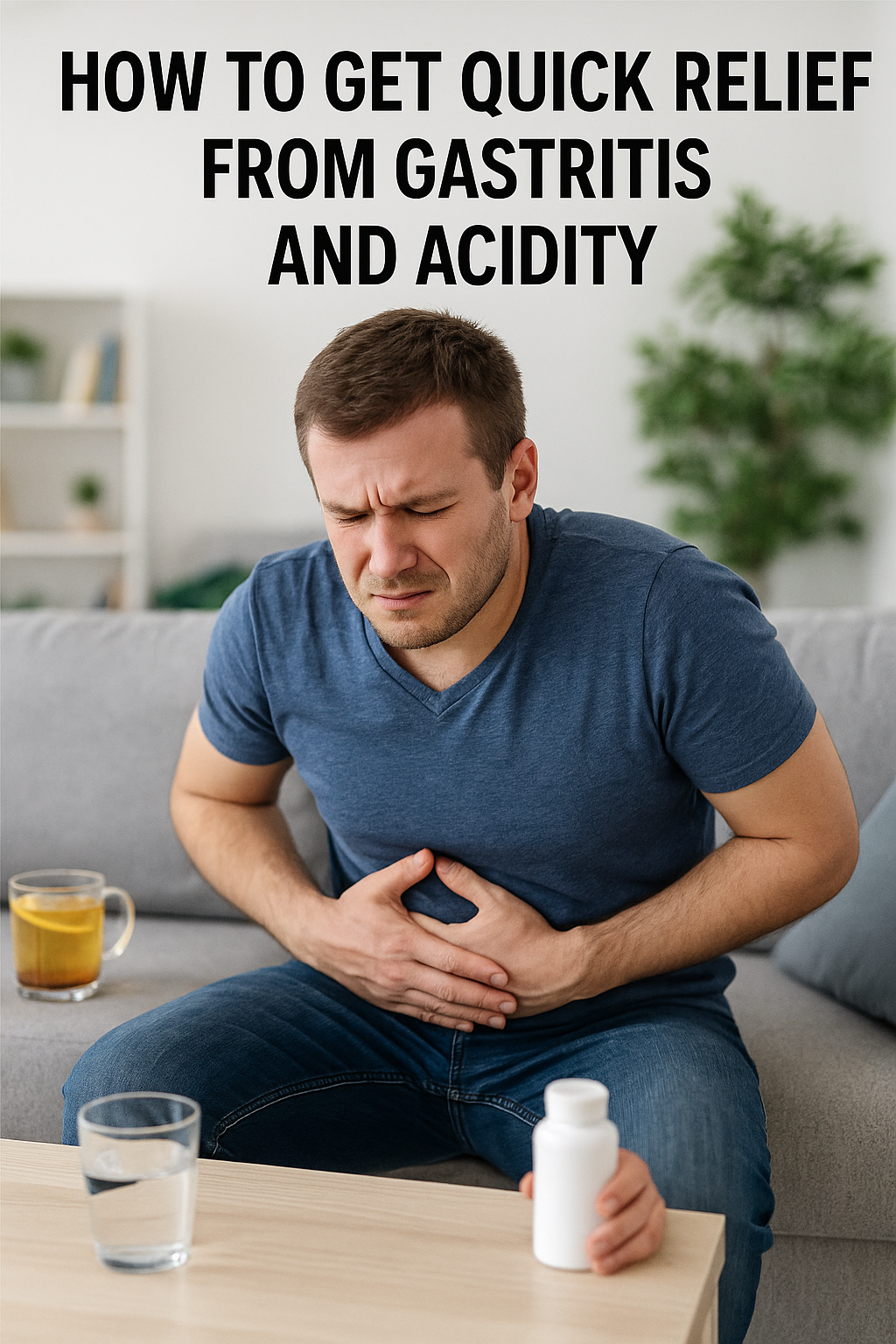
Are you experiencing burning acid, stomach pain, or indigestion? You’re not alone; gastritis affects millions of people around the world and can make even simple meals uncomfortable. This condition, which can be triggered by stress, irregular eating habits, or certain foods, often causes acidity, bloating, and discomfort. The good news is that with the right approach, you can get relief quickly.
In this article, we’ll look at what gastritis is, what the common symptoms and causes are, and, most importantly, how to get quick relief from acidity.
Overview
What is gastritis?
Gastritis is a general term used to describe the stomach lining that can be caused by the same bacterium that causes ulcers or by a poor lifestyle, such as poor eating habits, certain medications, or excessive alcohol consumption.
Gastritis is divided into two types based on its occurrence:
Acute Gastritis—This type of gastritis develops suddenly and can be caused by a bacterial infection (Helicobacter pylori), alcohol overconsumption, or stress from lifestyle changes.
Chronic Gastritis—It develops slowly over time as a result of long-term infection or overuse of medications such as nonsteroidal anti-inflammatory drugs. If left untreated, it may also increase cancer risk.
What are the symptoms and causes associated with gastritis?
- Pain or discomfort in the upper abdomen (commonly described as burning).
- Nausea and vomiting.
- Appetite loss (decreased hunger).
- Bloating (feeling full after eating a small meal).
- Dyspepsia, or indigestion.
- Stress and Anxiety
- In severe cases, vomiting blood or black stools.
When to find a doctor?
These symptoms usually go on their own and don’t require any medical care, but in case of long-term stomach pain, feeling nausea or lightheadedness, immediately seek your care to find the cause. Tell your doctor about your clinical history and other relevant information wherever required.
What are the causes of gastritis?
Gastritis occurs only when the mucosal lining of your stomach, which protects your stomach wall, is affected due to weakness, injury, or infection, leading to the breakdown of the mucosal barrier, resulting in inflammation and stomach damage, or by the action of digestive juices, such as
HCL, which can irritate the stomach lining and cause severe infection, and diseases such as Crohn’s disease can all increase the risk of gastritis.
What are the risk factors associated with gastritis?
The following are some of the risk factors associated with these conditions:
- Smoking irritates the stomach lining and increases gastric acid.
- As people age, their stomach lining thins, increasing their chances of developing gastritis.
- Excessive alcohol consumption causes stomach irritation and inflammation.
- Aspirin and ibuprofen are two examples of nonsteroidal anti-inflammatory drugs.
- Physical stress is caused by an injury, surgery, or illness.
- Autoimmune disorders develop when the immune system attacks the stomach lining.
- Bile reflux can lead to bile backflow from the small intestine into the stomach.
- Foods that are oily or spicy may cause stomach irritation for certain individuals because of their acidity.
How to Diagnose Gastritis?
Your doctor will first ask you about your clinical or medical history and symptoms, followed by a physical examination. They may also refer you for an upper GI tract imaging test, such as an X-ray, to check for any erosion or ulcer in your stomach.
Aside from that, your doctor may perform a microscopic examination, which requires a tissue sample from your GI tract to confirm it. During an endoscopy, they can collect a sample (biopsy). In which a tiny camera attached to the end of a long catheter (endoscope) is inserted into your upper gastrointestinal tract.
Endoscopy can also be used to perform a biopsy, confirming gastritis early on.
Some other tests can be done to check for gastritis
- Blood tests such as the H. Pylori test, Gastrin hormone test, Complete blood cell (CBC) test, and iron profile test
- A stool test can be performed to examine the color and blood in the stool.
What are the treatment options for gastritis?
Gastritis may lead to acidity that requires immediate attention. Usually, the acidity goes on its own without the need for medical attention, but you can take certain measures that will help you overcome the acidity. This includes
Medications:
Here are some of the medications that can help you to get quick relief from the acidity this includes:
- Antacids: Over-the-counter antacids (such as Tums and Maalox) can neutralize stomach acid and provide temporary relief.
- Proton Pump Inhibitors (PPIs): Medication like omeprazole, lansoprazole, or esomeprazole reduces stomach acid production and aid in healing.
- H2-receptor antagonists: Medications such as ranitidine (Zantac) and famotidine inhibit acid production.
- Antibiotics: If the gastritis is caused by Helicobacter pylori bacteria, antibiotics (like amoxicillin or clarithromycin) will be prescribed to treat the infection.
- Antiemetics: If you are experiencing nausea or vomiting, medications such as ondansetron can help.
Note: All of these medicines should be taken only after consulting a doctor and receiving a prescription.
How to prevent Gastritis?
- Eat smaller, more frequent meals: This can help reduce stomach acid and prevent overproduction.
- Avoid spicy and oily foods: These foods can irritate the stomach lining and worsen acidity.
- Limit caffeine, alcohol, and carbonated beverages: These can stimulate acid production.
- Include alkaline foods: Foods like bananas, melons, oatmeal, and leafy greens can help neutralize acid and improve digestion.
- Keep yourself Hydrated: Water can dilute stomach acid and help with digestion
- Avoid lying down immediately after eating: This can cause acid reflux, leading to heartburn and discomfort.
- Stop smoking: Smoking increases stomach acid and weakens the digestive system, affecting the stomach lining, which can worsen acidity and gastritis.
- Manage stress: Doing regular exercise and practicing relaxation techniques like deep breathing, yoga, or meditation may help.
- Ginger: Fresh ginger tea or chewing ginger may help soothe the stomach and reduce acidity.
- Apple cider vinegar: Some people find relief from acidity by mixing a small amount of apple cider vinegar with water.
- Aloe vera juice: It may help reduce stomach inflammation.
- Avoid Triggers: Keep track of specific foods or habits that trigger acidity or gastritis symptoms, and try to avoid them.
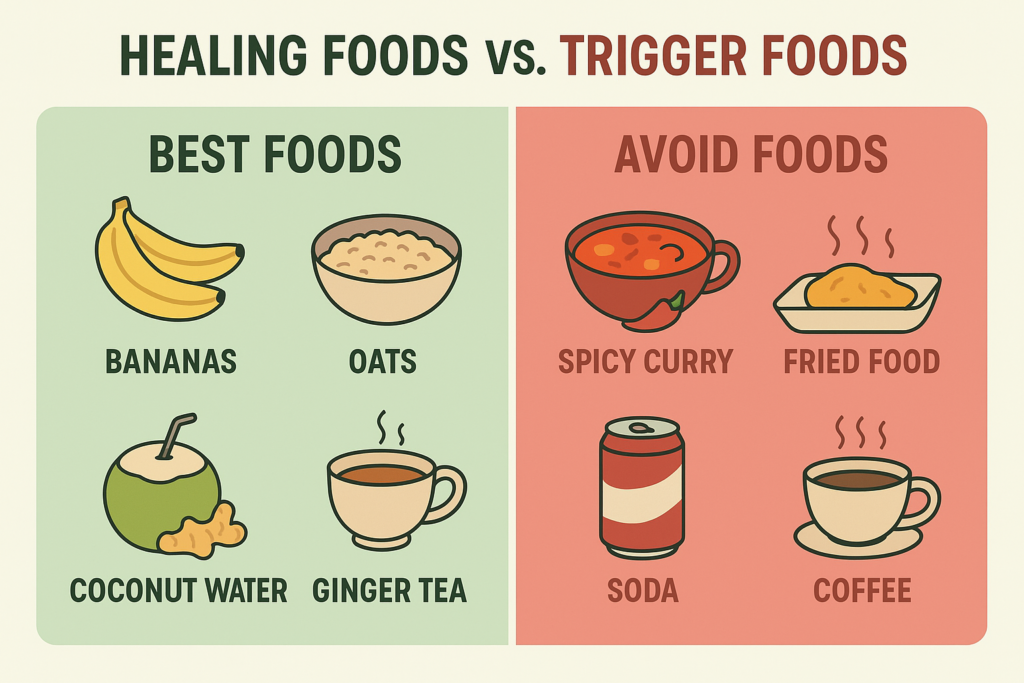
A Key takeaway
Gastritis is a very common condition nowadays that usually goes away on its own, but if you experience severe symptoms such as vomiting blood or black stools (indicating bleeding), see your doctor right away and get proper treatment, as this will help you recover quickly and improve your quality of life.
FAQ
What causes gastritis?
Gastritis can be caused by various factors, including infection with Helicobacter pylori, excessive alcohol consumption, prolonged use of NSAIDs, stress, or autoimmune conditions that attack the stomach lining.
What are the common symptoms of gastritis?
Common symptoms of gastritis include stomach pain, nausea, bloating, indigestion, and vomiting. In some cases, it may lead to bleeding or ulcers.
How is gastritis treated?
Treatment for gastritis typically involves medications like proton pump inhibitors, antacids, and antibiotics (for H. pylori infection), along with dietary changes, avoiding alcohol, and reducing stress.
